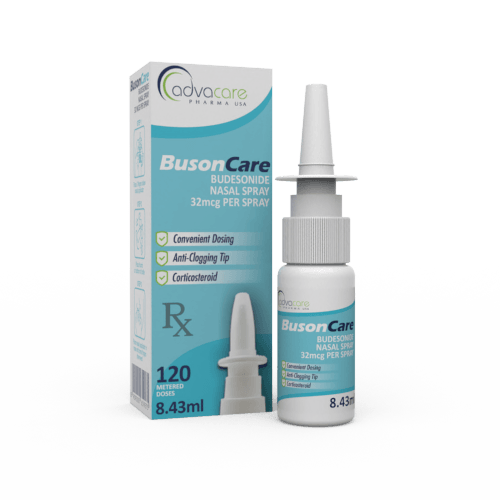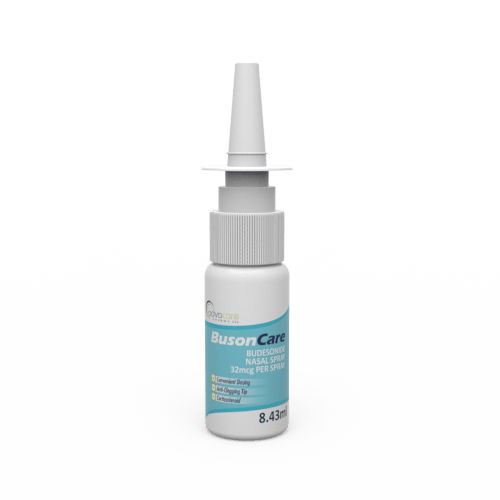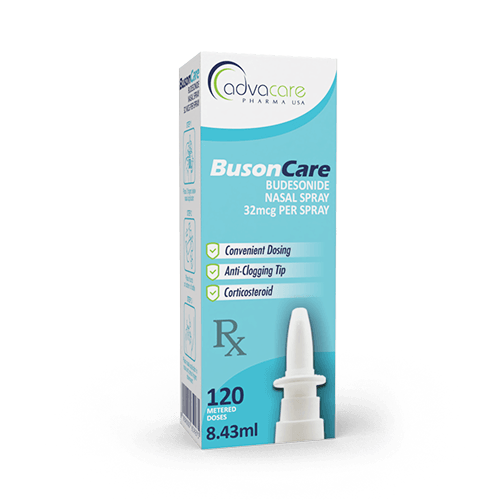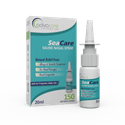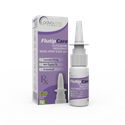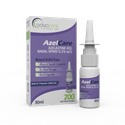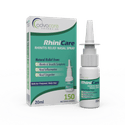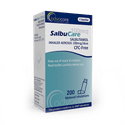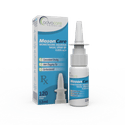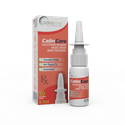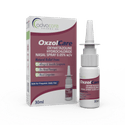- Home›
- Pharmaceuticals›
- Nasal Sprays›
- Budesonide Nasal Spray
Budesonide Nasal Spray
Dosage
Packaging
What is Budesonide?
Active Ingredients: Budesonide
Budesonide Nasal Spray is a steroid drug used to prevent and treat nasal symptoms caused by seasonal and year-round allergies. It relieves a runny nose, sneezing, and itchiness. It is also indicated for the treatment or prevention of nasal polyps. This medication is intended for intranasal use only.
Budesonide is classified as a corticosteroid. It works by reducing inflammation associated with allergic reactions.
AdvaCare Pharma also manufactures and distributes Budesonide Inhalation Suspension.
AdvaCare is a GMP-certified producer and supplier of Budesonide Nasal Spray. This medication is manufactured in our factories in China, India, and the USA. We routinely inspect our manufacturing facilities to ensure our products meet quality and safety standards.
Why choose us as your Budesonide Nasal Spray manufacturer?
AdvaCare Pharma, an American pharmaceutical company, manufactures Budesonide Nasal Spray at our GMP-certified facilities. We are committed to manufacturing more than 500 cost-effective, high-quality medicines that meet the highest industry standards and are readily available to patients worldwide. As an experienced Budesonide manufacturer, our global reach extends to over 65 markets where we supply a comprehensive range of 15+ nasal sprays to pharmaceutical distributors, pharmacies, hospitals and government institutions.
Uses
What is Budesonide Nasal Spray used for?
It is used to relieve nasal symptoms caused by allergic rhinitis (seasonal or perennial allergies), such as stuffy or runny nose, itching, sneezing, and post-nasal drip. Budesonide is also used to treat or prevent nasal polyps.
There has been some use of intranasal budesonide for the treatment of mild obstructive sleep apnea syndrome. It is also sometimes prescribed adjunctively in the treatment of acute bacterial rhinosinusitis in patients with a history of allergic rhinitis.
Can Budesonide Nasal Spray be used for sinus infections?
Budesonide Nasal Spray can be used in the treatment of a sinus infection. It can help to reduce inflammation within the nasal passageway. The dosage and duration should be recommended by a healthcare professional, as it is determined by the cause of sinusitis.
How is Budesonide Nasal Spray used?
This medication is manufactured as a liquid, which has been packaged metered spray bottle intended for nasal use only.
Before the first use of the bottle, the inhaler bottler should be primed by repeatedly pressing the pump (typically about 8 actuations) until a fine spray appears. If it has been more than 2 days since the last use, priming should be repeated (typically 1 actuation). If it has been longer than 2 weeks since the last use, the applicator should be rinsed and dried and priming will need to be repeated.
Before each use, it is advised to blow the nose to clear the nostrils. The bottle should be shaken gently and then the applicator inserted into the nostril. It is important to close off the other nostril and keep the bottle upright while releasing the spray. After application, the head should be leaned backward for a few seconds. It is recommended to avoid blowing the nose for at least 15 minutes afterward. Avoid spraying into the eyes or mouth.
How should Budesonide Nasal Spray be stored?
When not in use, the cap should be tightly sealed onto the spray bottle. It is recommended to keep the medicine in a dry, dark location at room temperature. Do not freeze Budesonide Nasal Spray.
What dose should be taken?
Adult Dosing Dosage may vary based on different medical indications:
- For seasonal/perennial allergic rhinitis, the usual dose is 1-4 sprays in each nostril, once daily. The starting dose is 1 actuation per nostril each day. The maximum dosage is 4 actuations in each nostril per day. If there have been no signs of improvement after 2 weeks, treatment should be reassessed.
- For prophylaxis of nasal polyps, the usual dose is 1-4 sprays in each nostril per day. The starting dose is 1 actuation per nostril each day. The maximum dosage is 4 actuations in each nostril per day.
- For the treatment of nasal polyps, the usual dose is 2 sprays in each nostril, administered twice daily. The maximum dosage is 4 actuations in each nostril per day.
Hepatic and renal dosing are not defined for this medication.
Pediatric Dosing For seasonal/perennial allergic rhinitis, the usual dose is as follows:
- For children from 6-11 years old: 1-2 sprays in each nostril, given once daily. The starting dose is 1 spray per nostril. The maximum dosage is 2 actuations per nostril daily.
- For children over the age of 12 years old: 1-4 sprays in each nostril, given once daily. The starting dose is 1 spray per nostril. The maximum dosage is 4 actuations per nostril daily.
If there have been no signs of improvement after 2 weeks, treatment should be reassessed.
For prophylaxis of nasal polyps, the usual dose is as follows:
- For children from 6-11 years old: 1-2 sprays in each nostril, given once daily. The starting dose is 1 spray per nostril. The maximum dosage is 2 actuations per nostril daily.
- For children over the age of 12 years old: 1-4 sprays in each nostril, given once daily. The starting dose is 1 spray per nostril. The maximum dosage is 4 actuations per nostril daily.
Refer to a doctor or pharmacist for guidelines on dosage.
Who can use Budesonide?
Budesonide Nasal Spray can be used by adults and children, but caution is advised for specific groups of patients.
Pregnant This medication can be used during pregnancy. Based on limited human data and limited absorption, fetal harm is not expected. Systemic corticosteroids have been associated with adverse effects; however, intranasal budesonide shows limited absorption during use.
Breastfeeding Budesonide intranasal is a preferred corticosteroid for the treatment of allergic rhinitis in breastfeeding women. Based on human data, there is no known risk of infant harm. Oral inhalation of this medication has been shown to be excreted in milk (approximately 0.3-1% of maternal dose), however, plasma budesonide levels in infants were below levels of quantification. This medication is not expected to affect milk production, though there are no human studies available to properly assess the risk.
Children This medication is considered safe for use in adolescents and children over 6 years old. The safety and efficacy for pediatric patients under 6 years old have not been established. Children may have an increased susceptibility to systemic toxicity and adverse effects. The lowest possible dosage should be administered, as reduced growth velocity has been associated with corticosteroids (including intranasal administration).
Geriatric There have not been sufficient studies to assess specific problems affecting the elderly population. In general, the lowest effective dose should be used for older patients.
Other warnings
During treatment, it is recommended to monitor the mucous membranes for any signs of a fungal infection, as there have been reports of fungal infections of the nose and pharynx due to Candida albicans. It is also advised to monitor for any signs of ocular changes and for signs of signs/symptoms of HPA axis suppression/adrenal insufficiency. For pediatric patients and those with treatment lasting longer than 12 weeks, growth should be monitored.
Budesonide intranasal should be avoided in patients with recent nasal surgery, nasal trauma, or nasal septal ulcers, as the medicine may delay the healing of the wounds.
Systemic corticosteroid effects, such as hypercorticism or adrenal suppression may occur during high-dosage intranasal therapy or at recommended dosages in susceptible individuals.
Signs of adrenal insufficiency may occur in patients who are replacing a systemic corticosteroid with a topical option. Symptoms of corticosteroid withdrawal may also occur.
Long-term usage of corticosteroids may mask infections or prolong viral infections. It is important for unvaccinated patients to take special care to avoid chickenpox and measles. Some regions contraindicate the use of corticosteroids in patients with tuberculosis infection or disease, those with ocular herpes simplex, and those with untreated infections (fungal, bacterial, systemic viral, or parasitic).
Caution should be expressed when prescribing to patients with certain ocular diseases such as cataracts or glaucoma. Ocular changes have been associated with the intranasal administration of corticosteroids.
Side Effects
As with all pharmaceuticals, some unwanted side effects can occur from the use of Budesonide Nasal Spray.
Common side effects include, but may not be limited to:
- cough
- sore throat
- nosebleeds
- bronchospasm
- nasal irritation
Serious side effects may include:
- severe bleeding from the nose
- signs of an allergic reaction (anaphylaxis, urticaria, rash, dermatitis, angioedema, pruritus)
- changes in eyesight
- signs of an infection or any flu-like symptoms
- growth suppression (in children)
- nasal septum perforation
For a comprehensive understanding of all potential side effects, consult a medical professional.
If any symptoms persist or worsen, or you notice any other symptoms, please call your doctor.
Precautions
Do NOT use Budesonide Nasal Spray if:
- You are allergic to any of the ingredients.
- You have infections such as tuberculosis.
- You have an unhealed wound or septal ulcer in the nasal passage.
- You have eye problems such as glaucoma and cataracts.
Before treatment, consult your doctor regarding any medications you are taking to address potential drug interactions.Some drugs known to interact with budesonide include strong CYP3A4 inhibitors, such as ritonavir, atazanavir, clarithromycin, indinavir, itraconazole, nefazodone, nelfinavir, saquinavir, and telithromycin.
This medication may not be suitable for people with certain conditions. It is important to consult with a doctor if you have any health conditions.
Avoid contact with people who have infections that may spread to others (such as chickenpox, measles, and flu).
Though it is unlikely, corticosteroids, such as budesonide, may slow down a child's growth when used for long-term treatment.
References
Efficacy and tolerability of budesonide aqueous nasal spray treatment in patients with nasal polyps
The main objective of this study was to assess the efficacy and tolerability of once-daily treatment with budesonide aqueous nasal spray in patients with nasal polyps. It is a randomized, double-blind, placebo-controlled, parallel-group study that included 16 hospital clinics and 183 patients with nasal polyps that lead to serious symptoms.
Patients from the study included 4 different budesonide aqueous nasal treatments:
- 128mg once daily in the morning and placebo in the evening
- 128mg twice daily
- 256mg once daily in the morning and placebo in the evening
- placebo for 8 weeks
During the study, the nasal polyp size was measured and also the peak nasal inspiratory flow. This was done at the beginning of the research, at the 4th and 8th week of treatment. All treated patients had reduced polyp size and also the patients had reduced symptoms within 1 to 2 days after the first treatment.
The conclusion of this research is that 128mg had the best effect in treating nasal polyps, while increased doses do not show any additional efficacy.

You might be interested in...
Why AdvaCare Pharma?
As an industry leader, we are aware of our responsibility to provide affordable and sustainable solutions to improve healthcare worldwide.
